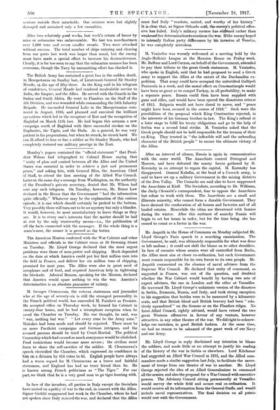Mr. Asquith in the House of Commons on Monday subjected
Mr. Lloyd George's Paris speech to a searching examination. The Government, he said, was ultimately responsible for what was done or left undone ; it could not shift the blame on to other shoulders. In face of enemies whose armies were all controlled from Berlin, the Allies must also at closer co-ordination, but each Government must remain responsible for its own forces to its own people. Mr. Asquith commented on the absence of naval advisers from the Supreme War Council. He declared that unity of command, as suggested in France, was out of the question, and doubted whether the War Cabinet would benefit by having two sets of expert advisers, the one in London and the other at Versailles. He traversed Mr. Lloyd George's unhistoric version of the disasters in Serbia, Rumania, Russia, and Italy, and took strong exception to his suggestion that battles were to be measured by a kilometric scale, and that British blood and British bravery had been " rela- tively squandered" on the Somme or on the Flanders ridges. No- Inter-Allied Council, rightly advised, would have vetoed the two, great Western offensives in favour of any venture, however attractive, in any other theatre of the war. We did right to acknow. ledge our mistakes, in good British fashion. At the same time, we had no reason to be ashamed of the great work of our Navy and our Army.






































 Previous page
Previous page